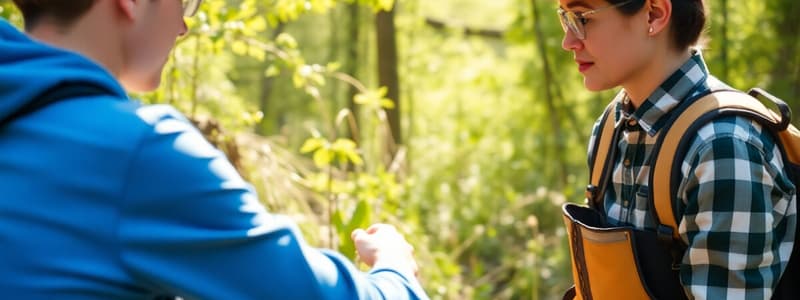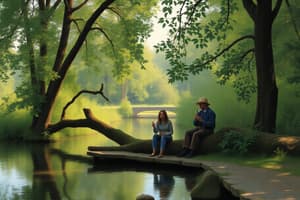Podcast
Questions and Answers
What is the primary task specified in Activity 1?
What is the primary task specified in Activity 1?
- To list 3 outdoor recreational activities and provide reasons. (correct)
- To describe 5 different types of equipment for activities.
- To list 5 indoor activities.
- To explain 3 reasons for choosing specific activities.
Which element must be included alongside each activity listed in Activity 1?
Which element must be included alongside each activity listed in Activity 1?
- A detailed description of the equipment required.
- The historical background of each activity.
- A comparison of each activity with another one.
- A justification for wanting to do each activity. (correct)
How many recreational activities are required to be listed in the first activity?
How many recreational activities are required to be listed in the first activity?
- Three (correct)
- Two
- Five
- Four
What is the implied setting for the recreational activities students should choose based on the first activity?
What is the implied setting for the recreational activities students should choose based on the first activity?
Besides listing, what additional information is needed for each of the selected recreational activities?
Besides listing, what additional information is needed for each of the selected recreational activities?
Flashcards
Outdoor Recreational Activities
Outdoor Recreational Activities
Outdoor recreational activities are forms of leisure or amusement that take place outdoors and involve physical activity, nature, or exploration.
Hiking
Hiking
Hiking involves walking on trails through natural areas, often uphill or across varied terrain.
Camping
Camping
Camping is the act of spending one or more nights outdoors in a temporary shelter, typically a tent.
Cycling
Cycling
Signup and view all the flashcards
Why do people enjoy outdoor activities?
Why do people enjoy outdoor activities?
Signup and view all the flashcards
Study Notes
Outdoor Recreation Definition
- Outdoor recreation is organized activities done during free time, for personal reasons, involving interaction between humans and nature.
Learning Objectives
- Define outdoor recreation
- Understand motivations for engaging in outdoor recreation
- Identify common outdoor recreational activities
- Recognize benefits of outdoor recreation
- Understand the importance of adhering to Leave No Trace principles
Table of Contents
- Outdoor Recreation: Definition and overview
- Reasons for Engaging in Outdoor Recreation
- Popular Outdoor Recreational Activities (Land, Water, Air)
- Benefits of Outdoor Recreation (Physical, Psycho-Emotional, Social, Economic, Spiritual)
- Assessing Physical Fitness
- Leave No Trace Principles (7 Principles)
Reasons for Engaging in Outdoor Recreation
- Personal satisfaction and enjoyment
- Connecting with nature, particularly for those in urban areas
- Pursuing personal hobbies like photography
Popular Outdoor Activities (Land)
- Mountaineering
- Trekking/Hiking
- Camping
- Backpacking
- Picnic
- Bird-watching
- Mountain Biking
- Orienteering
- Canyoneering
- Rock Climbing
Popular Outdoor Activities (Water)
- Swimming
- Snorkeling
- Diving
- Surfing
- Kayaking
- Whitewater Rafting
- Sailing
- Fishing
- Canoeing
- Bamboo Rafting
Popular Outdoor Activities (Air)
- Parasailing
- Skydiving
- Paragliding
Benefits of Outdoor Recreation (Physical)
- Allows movement (walking, running, swimming, biking, paddling)
- Expends energy, promoting cardiovascular and muscular fitness
- Improves immune system function
Benefits of Outdoor Recreation (Psycho-Emotional)
- Aids rest, relaxation, stress relief, and revitalization
- Enhances self-esteem, confidence, and creativity
- Contributes to personal and spiritual growth
Benefits of Outdoor Recreation (Social)
- Fosters closer family bonds through activities
- Creates opportunities to meet and interact with others sharing the same passion for outdoor recreation
Benefits of Outdoor Recreation (Economic)
- Increased productivity at work due to relaxed body and mind
- Ecotourism and related economic activities contribute to economic growth
Benefits of Outdoor Recreation (Spiritual)
- Connecting with nature instills calmness and peace
- Promotes healing, rejuvenation, and soothes the body and soul
Assessing Physical Fitness
- Ability to perform daily tasks with alertness and vigor without excessive fatigue
- Evaluate gadget usage
- Assess rest and sleep habits
- Evaluate nutrition and eating habits
- Evaluate stress level related to school or work
Leave No Trace Seven Principles
- Principle 1: Plan Ahead and Prepare: Check permits, learn rules, gather necessary equipment and be prepared for emergencies and changing weather. Keep group size small and repack food.
- Principle 2: Travel and Camp on Durable Surfaces: Walk, run, bike, or camp on established trails, rocks, gravel, or dry grass. Avoid trampling soft surfaces or vegetation. Use existing campsites and maintain small and discreet campsites.
- Principle 3: Dispose of Waste Properly: Pack in, pack out; properly dispose of all trash, food waste, human waste.
- Principle 4: Leave What You Find: Leave natural and historical sites as they are found; do not touch or mark them. Don't take plants, rocks, or animals. Avoid introducing non-native species.
- Principle 5: Minimize Campfire Impacts: Use lightweight stoves, if campfires are permitted, use designated fire rings or mound fires and use only gathered, broken-by-hand wood. Burn all wood to ash and completely extinguish the fire. Scatter cool ash.
- Principle 6: Respect Wildlife: Observe animals from a distance; avoid feeding or getting too close during sensitive times. Protect wildlife by securing your food and trash and ensure pets are controlled if allowed.
- Principle 7: Be Considerate of Other Visitors: Respect people living and working in the area. Let other visitors have a good experience. Minimize noise and be courteous to others. Camp away from trails and other visitors.
½ crosswise ACTIVITY 1
- List 3 outdoor recreational activities you want to try and explain why.
Studying That Suits You
Use AI to generate personalized quizzes and flashcards to suit your learning preferences.




